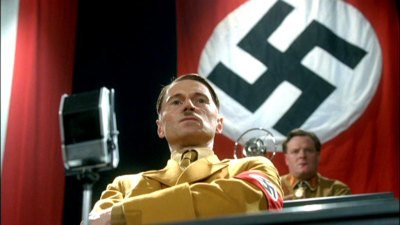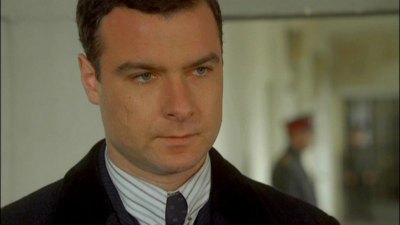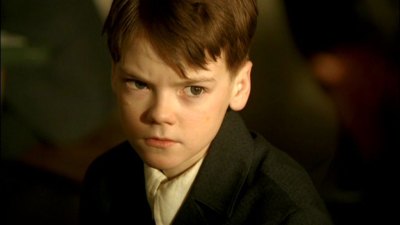| Reviews & Columns |
|
Reviews DVD TV on DVD Blu-ray 4K UHD International DVDs In Theaters Reviews by Studio Video Games Features Collector Series DVDs Easter Egg Database Interviews DVD Talk Radio Feature Articles Columns Anime Talk DVD Savant Horror DVDs The M.O.D. Squad Art House HD Talk Silent DVD
|
DVD Talk Forum |
|
|
| Resources |
|
DVD Price Search Customer Service #'s RCE Info Links |
|
Columns
|
|
|
Hitler - The Rise of Evil
Koch Vision has released a two-disc special edition of the 2003 CBS miniseries Hitler: The Rise of Evil, a beautifully photographed, expensive-looking three hour-plus mini starring Scottish actor Robert Carlyle in the title role. You may remember that there was a storm of controversy when the Hitler: The Rise of Evil TV project was announced. Evidently, the original concept of the mini was to show much more of Hitler's younger days, with the purpose of trying to come to grips with an explanation or at least an examination of what may have caused his all-encompassing hatred and mental psychosis. This was immediately taken by various activist groups and historians as CBS somehow attempting to "humanize" Hitler (and by extension of that assumption, perhaps, somehow excuse his behavior in some way), with the resulting negative publicity forcing CBS to bring in additional experts to tweak the mini, and ultimately diverting the focus of the mini away from the producers' original vision of the project.

Quite a chorus of disapproval still met Hitler: The Rise of Evil before it premiered, which of course immediately died away once the show debuted, because, as everyone could see, it was a competently scripted and acted examination of the mass murderer - and nothing more. CBS didn't excuse his behavior any more than they provided a startlingly new or definitive answer to his abominable actions (as if there could ever be such an answer). As with any kind of film such as Hitler: The Rise of Evil, focusing on an historical figure who has no doubt inspired thousands and thousands of scholarly treatises, it couldn't possibly satisfy all the myriad interpretations of the historical record. As well, as evidenced by a behind-the-scenes featurette bonus included on this two-disc set, major changes were made before and after shooting commenced, with the final broadcast version of Hitler: The Rise of Evil looking quite different than what was originally planned.
Probably most notable in the changes CBS made to the mini is the abbreviated treatment of Hitler's youth, with a montage covering his childhood, the death of his mother, and his eventual trek to Munich all accomplished before the opening credits finish (Stockard Channing, who's second billed as Hitler's mother, suffers the most from this editing, showing up on screen for only about five minutes). Whether that sketchy treatment is due to a paucity of solid historical information from this period of Hitler's life, or the fact that what CBS may have "invented" for the mini didn't pass muster with the experts brought in to oversee the project, is anybody's guess. But certainly there's nothing in the depiction of this period of time - the period that critics were most concerned with - that makes us sympathize with Hitler (even the beatings he received from his older father are tempered with the miniseries' depiction of Hitler as a spooky, hate-filled child who wasn't above utilizing violence - arson of his father's beehives - to express his sociopathological leanings).
Where Hitler: The Rise of Evil departs from most depictions of the mass murderer is its focus on the internal politics of the Bavarian state, and Hitler's systematic exploitation of not only that government's nascent democracy, but the worsening economic situation that cause such violent civil unrest. Hitler: The Rise of Evil spends almost all of its time on scenes of political maneuvering; after a brief look at Hitler's war service and his failed attempts at being an artist, much of the series' sequences consists of scene afer scene of Hitler slowly climbing his way up the ladder of influence in German society. From the absolute lowest of the low - a petty spy for the German army, watching and reporting on potentially dangerous political parties - Hitler soon finds his metier in oratory flourish, and begins to sense that his sick hatred for Jews will find a receptive audience in the increasingly restless German populace.

Actively helping Hitler's cause are aristocrat Ernst Hanfstaengl (Liev Schreiber), who sees in Hitler a political monster who can be manipulated and controlled to fight the Communists who vie for control of Germany, and his wife, Helene (Julianna Margulies), an American who at first detests the grotty little man from Austria, but soon falls under his hypnotic spell. Hitler: The Rise of Evil is quite adept at showing the various stages of Hitler's ascent into the world of politics and power, and how, according the mini's viewpoint, those who helped Hitler soon realized they were powerless to stop him (a supposition that ignores how many people truly believed in Hitler's mission and who hooked their wagons to his star for economic, political and ideological gain). Opposition to Hitler is represented in Hitler: The Rise of Evil by Fritz Gerlich (Matthew Modine), a crusading journalist who proved to be a prickly thorn in Hitler's side - until Hitler gained the Chancellory and had Gerlich imprisoned and killed at Dachau.
But while Hitler: The Rise of Evil is dense in the actual build-up and machinations of Hitler's rise to power, it's AWOL on looking at the actual country and people of Germany, their complicity in Hitler's rise, the various nationalistic trends as well as the Aryan mythology that helped justify their actions, as well as ingrained prejudices against the Jews - all major factors in Hitler's rise to power. Were these elements originally planned for Hitler: The Rise of Evil, or were they indeed shot, and then edited out? It's hard to say, but it's apparent from Hitler and I: Reflections of Evil, the behind-the-scenes documentary that's included on the Hitler: The Rise of Evil two-disc set, that scenes were shot depicting the Holocaust and an older Hitler - scenes that don't show up in the final cut - that may indicate that such subjects may have been tackled. Tacked on as if in afterthought, the magnitude of Hitler's crimes against humanity are displayed in a few brief title cards at the end of the feature, further emphasizing the fact that Hitler: The Rise of Evil is primarily concerned with the beginnings of Hitler's crimes, not the end results.
After watching the behind-the-scenes documentary on the production of Hitler: The Rise of Evil, it may be that these factors were eliminated prior to the chaotic shooting (apparently, there was no finished script, or even a signed actor for the part of Hitler, just weeks prior to the start of shooting). Invention for purposes of dramatic effect are of course incorporated (as they are with all historical films and documentaries), such as having Helene directly take the gun out of Hitler's hand when he threatens suicide after his disastrous Beer Hall Putsch (thereby letting the audience have the fake thrill of saying to themselves, "If only she hadn't stopped him..."). As well, Hitler: The Rise of Evil briefly delves into the personal life of Hitler, looking at his, at the very least, highly unconventional relationship with his young niece, Geli Raubal (Jena Malone), who some historians believe was Hitler's lover, and who may have committed suicide over the guilt associated with this relationship. Hitler's subsequent affair with Eva Braun (Zoe Telford) is also briefly touched on, but clearly, the focus of Hitler: The Rise of Evil is political, not personal.
The cast is quite good, with Carlyle memorable as Hitler. While Carlyle certainly doesn't go for subtlety here (frequently, he's seen bugged-eyed with spittle flying), that performance is in keeping with the busy but essentially conventional outlook of Hitler: The Rise of Evil as a whole. Margulies is ineffectual as Helen Hanfstaengl, and Modine is all wrong as Gerlich - an aw shucks American hero-type who bears little resemblance to the real Gerlich, and who plays the role without an ounce of shading or foreboding or dread. It's a surprisingly sunny turn. However, Liev Schreiber is a standout in his watchful, nuanced performance as Ernst Hanfstaengl. For my money, Schreiber is one of the most underutilized actors out there today, and his knowing, technically proficient performance in Hitler: The Rise of Evil is the best thing going for it. From a production end, Hitler: The Rise of Evil is simply gorgeous to look at, with movie-quality cinematography and a lush production design rich in detail. However, after watching Hitler and I: Reflections of Evil, it's apparent that whatever Hitler: The Rise of Evil was originally going to be, that vision didn't make it to the final broadcast cut.

The DVD:
The Video:
The anamorphically enhanced, 1.78:1 widescreen video image for Hitler: The Rise of Evil is beautiful, with almost no picture anomalies, and no compression issues. Colors are delicately rendered, with true values.
The Audio:
The Dolby Digital English 5.1 audio mix is also quite robust, with nice separation during the early battle sequences.
The Extras:
Two sensational extra features are included here in the Hitler: The Rise of Evil two-disc set. First, the two-and-a-half-hour documentary, Hitler: A Career (Hitler: Eine Karriere), from 1977 and directed by Joachim Fest and Christian Herrendoerfer, is a terrifically energetic and sure reading of Hitler's life, with some amazing color footage of Third Reich festivities. Next, we have Hitler and I: Reflections of Evil, a behind-the-scenes look at the chaotic pre-production of Hitler: The Rise of Evil, directed by David Cherniack. It runs 52 minutes, and gives a good indication of how much was altered -- even after shooting was finished -- from the original take on Hitler: The Rise of Evil.
Final Thoughts:
Apparently, from day one, the Hitler: The Rise of Evil project was the subject of intense debate in and outside of CBS, with self-censoring alterations to the script, a harried pre-production, and a possibly major edit that may have eliminated a broader take on the subject, further complicating matters. As it stands, Hitler: The Rise of Evil is a competent, engrossing look at one aspect of his early rise to power -- his manipulations of the Germany democracy and ruling class through deceit and strong-arm tactics - filmed sumptuously on a big budget. The acting for the most part is fine, and the extras included on this two-disc set are in some ways, far superior to the main feature they support. I highly recommend the two-disc special edition of Hitler: The Rise of Evil.
Paul Mavis is an internationally published film and television historian, a member of the Online Film Critics Society, and the author of The Espionage Filmography.


|
| Popular Reviews |
| Sponsored Links |
|
|
| Sponsored Links |
|
|
| Release List | Reviews | Shop | Newsletter | Forum | DVD Giveaways | Blu-Ray | Advertise |
|
Copyright 2024 DVDTalk.com All Rights Reserved. Legal Info, Privacy Policy, Terms of Use,
Manage Preferences,
Your Privacy Choices | |||||||













